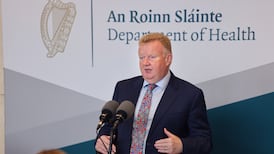The number of college places in health-related courses is to be doubled as part of a plan to address workforce shortages in the sector, according to Minister for Health Stephen Donnelly.
Mr Donnelly said there will be “at least a doubling” of college places relating to healthcare workers, though he did not specify a timeline for achieving this.
Speaking in Dublin Castle where he attended a conference on enhancing community care, the Minister said there was a global shortage of health workers and Ireland needed to ensure it had enough professionals to work in the sector.
Some 3,500 new healthcare professionals are being recruited to work in 96 community health networks, thus building a new system of care “unlike anything seen before”, he said.
READ MORE
As envisaged under the Sláintecare plan, each health network will cover 50,000 people.
“When fully embedded, we will have fully developed integrated care pathways across every acute hospital and community health area throughout the country and available to all,” he told the conference.
Disease management
Mr Donnelly said 2,200 of the additional staff were already in place or were being recruited, rising to 2,500 by the end of the year.
Of the 96 planned networks, 87 are in place, as are 14 out of 30 planned chronic disease management teams and 21 out of 30 planned teams for treating older people.
Mr Donnelly expressed concern about likely pressure on the health service this winter from a combination of Covid-19, flu and other respiratory disorders, along with high levels of patients presenting to emergency departments.
Speaking at the event, Prof Chris Ham, former chief executive of the King’s Fund UK, said Ireland’s ageing population, along with a rise in chronic conditions such as diabetes and asthma, requires care to be “joined up around patients”, especially those with complex needs.
“International evidence shows that integrated care can improve patient outcomes and patient experience by improving communication between healthcare teams and putting the needs of patients at the centre of their concerns. And by strengthening community services, it can moderate pressures on hospitals.”














